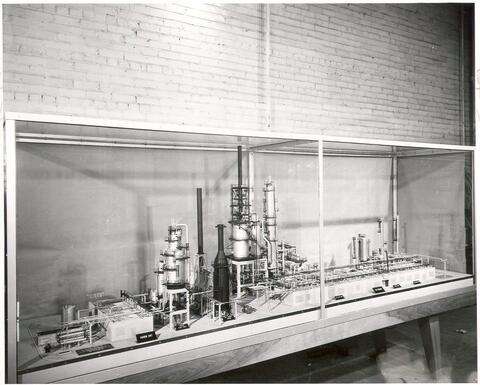
Zona do título e menção de responsabilidade
Título próprio
Petroleum Engineering - "Cat Cracker" Model
Designação geral do material
- Material gráfico
Título paralelo
Outra informação do título
Título e menções de responsabilidade
Notas ao título
Nível de descrição
Item
Entidade detentora
Código de referência
Zona de edição
Menção de edição
Menção de responsabilidade da edição
Zona de detalhes específicos de materiais
Menção da escala (cartográfica)
Menção da projecção (cartográfica)
Menção das coordenadas (cartográfico)
Menção da escala (arquitectura)
Autoridade emissora e denominação (filatélica)
Zona de datas de criação
Data(s)
-
1955 (Produção)
Zona de descrição física
Descrição física
1 photograph : b&w ; 20 x 24 cm
Zona dos editores das publicações
Título próprio do recurso continuado
Títulos paralelos das publicações do editor
Outra informação do título das publicações do editor
Menção de responsabilidade relativa ao editor do recurso contínuo
Numeração das publicações do editor
Nota sobre as publicações do editor
Zona da descrição do arquivo
Nome do produtor
História custodial
Âmbito e conteúdo
Image of a cat-cracker-model relating to Petroleum Engineering.
Zona das notas
Condição física
Fonte imediata de aquisição
Organização
Idioma do material
Script do material
Localização de originais
Disponibilidade de outros formatos
Restrições de acesso
Termos que regulam o uso, reprodução e publicação
Photographer: Saskatoon Star-Phoenix
Copyright: Saskatoon Star-Phoenix
Instrumentos de descrição
Materiais associados
Ingressos adicionais
Nota geral
From Star-Phoenix article on back of image: "Petroleum Engineering - a new branch in the College of Engineering - is being introduced at the University of Saskatchewan for the 1955-1956 term. The new branch will take its place along with the other seven branches of engineering: agricultural, chemical, civil, electrical, geological, mechanical and engineering physics. The university's first appointment in the branch is assistant professor R.B. Shearn, a graduate of the University of Birmingham. The course is designed for the student intending to engage in the engineering phases of the production of oil and gas, rather than the exploration and geological work to do with the searching and development of oil and gas fields. Students who have satisfactorily completed the third year in chemical engineering or geological engineering will be admitted to a final fourth year in petroleum engineering. Because of the differences in the first three years of training, part of the work will differ for the two groups. Both will, on graduation, have a similar amount of engineering training, but one will have a broader knowledge of chemistry and the other of geology. Either is quite satisfactory for this field of engineering and allows for later specilization, if desired. Imperial Oil Ltd. presented a model of a modern oil refinery to the engineering college in November. The model is of the latest fluid catalytic cracking unit and vacuum distillation unit of the Regina plant. The model is built on a scale of 1/4 inch to the foot. It measures six feet by twwn feet and is approximately four feet high. These units formed the magjor part of an expansion program which was two years in the building and cost more than $7 million. The model is valued at $5,000. The model travelled to Saskatoon in a special moving van on a six-inch thickness of felt padding. On top of this were inflated rubber tubes, covered by a 700 pound sheet of boiler plate. On top of it were more pads and a huge sheet of sponge rubber. The model sat on a wooden frame and was held down by robes attached to large coil springs. Old tires were placed between the walls of the van and the model. These precautions were necessary to prevent the vibration from shaking the balsa wood and plastic to pieces. The high towers of the model were braced with wood, heavy cord and adhesive tape. The model is not a show piece but for practical demonstration purposes in the college."

